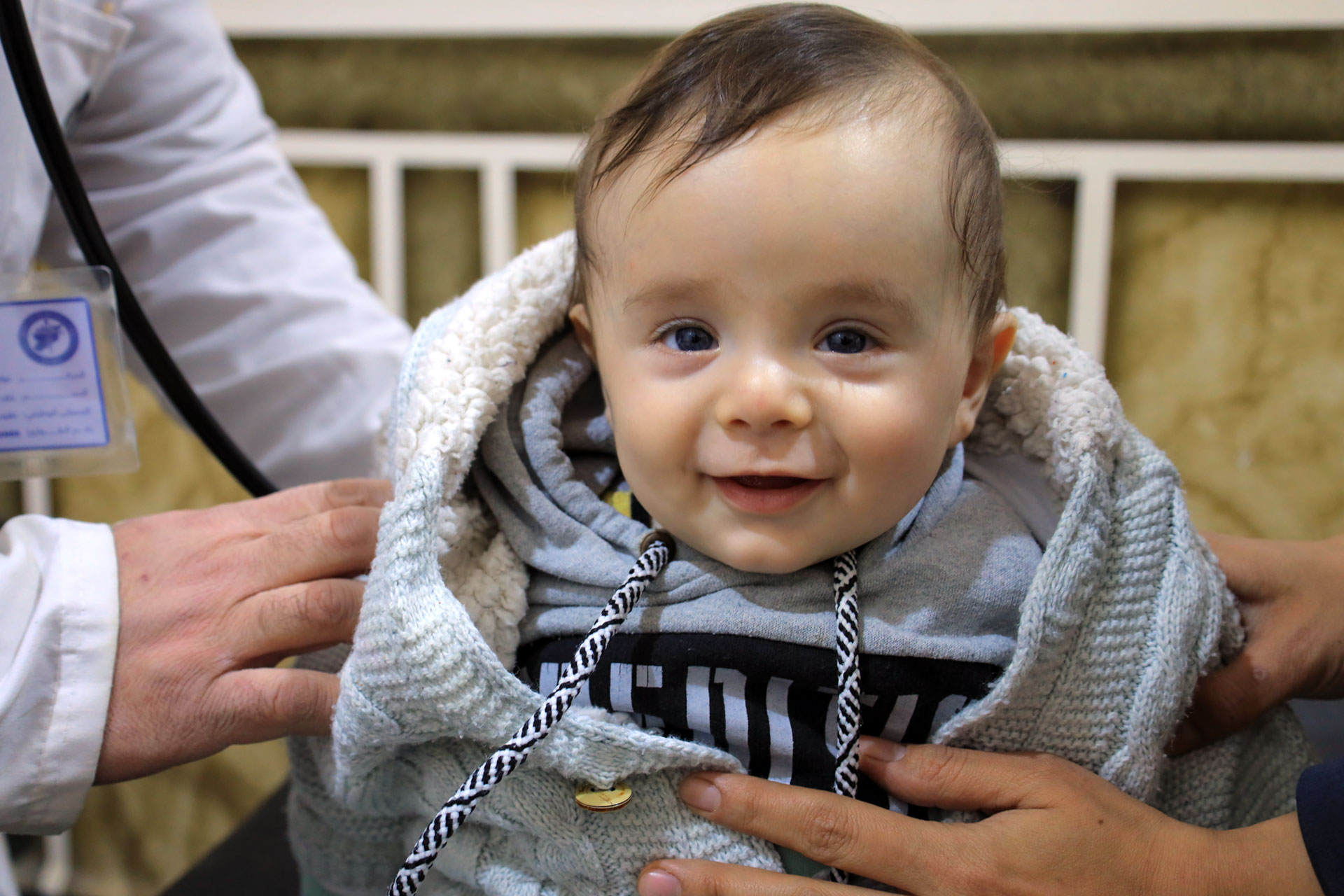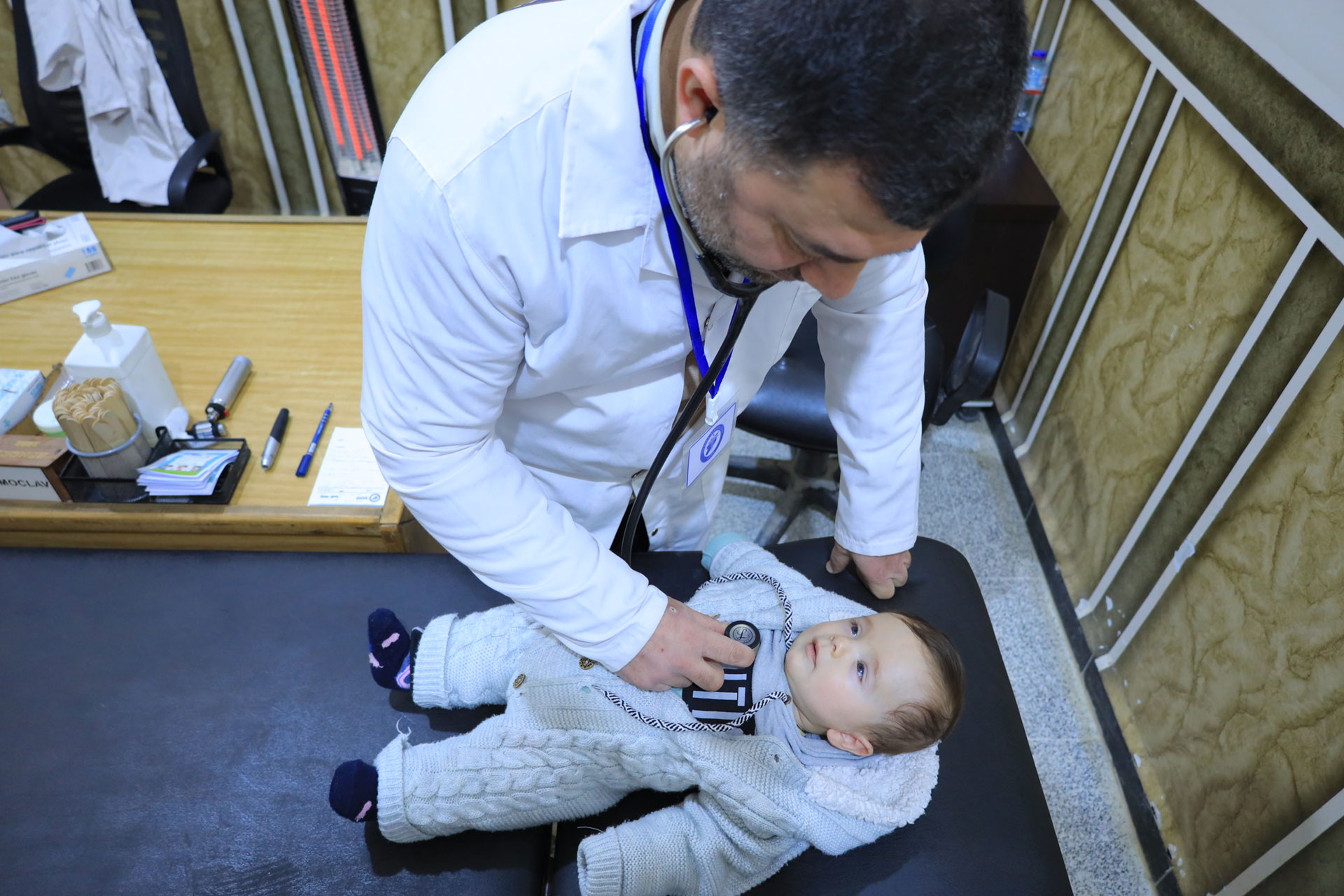 Four-month-old Walid Al-Ahmad smiles after receiving treatment at the Paediatric Clinic in Kurin Health Centre, Idlib. Photo credit: WHO27 August 2025, Idlib, Syrian Arab Republic – Four-month-old Walid Al-Ahmad was struggling to breathe when his mother brought him to the Paediatric Clinic at Kurin Health Centre. He was coughing, feverish and would wheeze while breastfeeding.
Four-month-old Walid Al-Ahmad smiles after receiving treatment at the Paediatric Clinic in Kurin Health Centre, Idlib. Photo credit: WHO27 August 2025, Idlib, Syrian Arab Republic – Four-month-old Walid Al-Ahmad was struggling to breathe when his mother brought him to the Paediatric Clinic at Kurin Health Centre. He was coughing, feverish and would wheeze while breastfeeding.
“We provided nasal serum to clear his airways, gave nebuliser sessions and prescribed paracetamol to ease his fever and pain,” says Dr Khalid Al-Rashwani, who treated Walid. “We also explained to his mother how to care for him at home and avoid smoke and odours that could worsen his breathing.”
Thanks to this timely intervention, Walid recovered without needing hospital care. His story reflects the daily reality for families in rural Idlib where respiratory infections, diarrhoeal diseases, malnutrition and skin conditions are among the most common illnesses children face. Earlier this year, when bronchiolitis cases rose sharply, the Paediatric Clinic was able to manage mild to moderate patients locally, referring the most severe to hospitals when beds were available.
Managed by the Syrian American Medical Society, the Clinic provides care to children from 10 surrounding villages. In a recent reporting period, more than 6400 children were treated. An average of 50 children are seen each day, many from families who cannot afford the high cost of private care or travel to distant hospitals.
“The clinic provides reliable paediatric services at no cost to families,” says Dr Khalid. “Without it, many would have no access to medical care for their children.”
Expanding access to care
 Dr Khalid Al-Rashwani examines Walid Al-Ahmad at Kurin Health Centre in Idlib. Photo credit: WHOThrough the Central Emergency Response Fund (CERF), WHO supports 4 health facilities – including Kurin Health Centre – and 3 ambulances in Idlib and Aleppo. These services are critical in a country where just 57% of hospitals and 37% of primary health care centres are fully functional and more than 15.8 million people need health assistance.
Dr Khalid Al-Rashwani examines Walid Al-Ahmad at Kurin Health Centre in Idlib. Photo credit: WHOThrough the Central Emergency Response Fund (CERF), WHO supports 4 health facilities – including Kurin Health Centre – and 3 ambulances in Idlib and Aleppo. These services are critical in a country where just 57% of hospitals and 37% of primary health care centres are fully functional and more than 15.8 million people need health assistance.
CERF support enables WHO and its partners to deliver medicines and emergency health kits to facilities across Syria. Nineteen mobile medical teams bring consultations, referrals and follow-up care to underserved areas from Aleppo to Deir-ez-Zor. Mental health and psychosocial support is being expanded through key referral hospitals such as Azaz and Ibn Khaldun, reaching people affected by displacement and trauma.
“WHO and CERF support has greatly eased the burden on families,” says Dr Khalid. “It allows us to provide free consultations and medicines and reduces the need for families to travel to central hospitals.”
Looking ahead
As Syria works towards a unified national health system and long-term recovery, ensuring health services continue without interruption is critical. For Walid, and for thousands of other children across Idlib, the Kurin Clinic brings the possibility of a healthier future closer to home.



